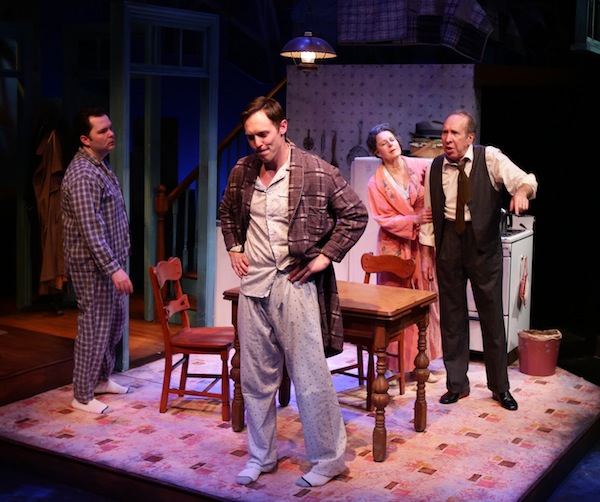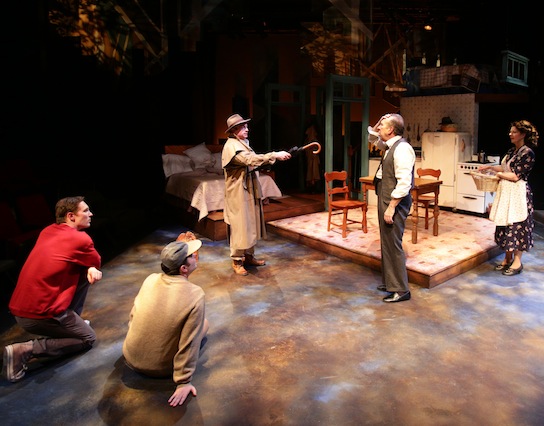Theater Review: A Moderately Powerful “Death of a Salesman” from The Lyric Stage Company
A lack of dramatic combustion sometimes makes the Lyric Stage Company production, despite its intelligent detail, more staidly melodramatic than it should be.
Death of a Salesman, by Arthur Miller. Directed by Spiro Veloudos. Set design, Janie E. Howland. Staged by The Lyric Stage Company, 140 Clarendon Street, Boston, through March 15.

The Loman family in the Lyric Stage Company production. (l to r) Joseph Marrella (Happy), Kelby T. Akin (Biff), Paula Plum (Linda), and Ken Baltin (Willy). Photo: Mark S. Howard.
By Bill Marx
The Lyric Stage Company’s stirring production of Death of a Salesman taps into the entropy that drives the play’s downward trajectory: this a story about exhaustion, a drama about an emaciated American afterlife, the can-do sprit drained out of a family and its future. As Willy Loman, Ken Baltin in the opening scene shuffles wearily into the kitchen, a man zero-to-the-bone, dropping his suitcases if they were blocks of cement. But it is Paula Plum’s Linda who supplies the startling complimentary image. After she bucks Willy up he leaves the bedroom and, in this moment of solitude, the actress’ face sinks and sags, her soul drooping out of sheer fatigue. Her reaction is a reminder that Miller’s play is not only about how much futile energy it takes to dream away a life as a salesman … it is also about how much life is drained from others to make a man who is no longer (perhaps never was) well liked feel well liked. In that sense, Death of a Salesman is about the price of acting – how much are you willing sacrifice of yourself to spin reality for the sake of another.
That brilliantly nuanced moment from Plum provides the key to the strengths and the weaknesses of the production, which is firmly anchored in two powerful performances.
Plum’s Linda is no wilting helpmate, but tigerish when she needs to be, as when she orders sons Happy and Biff out of the house after they have abandoned their father. You sense that she is torn apart, but Plum suggests that Linda also finds release in the confrontation – she revels in a rare moment of telling the truth and acting on her repugnance. Linda’s final speech over Willy’s grave is filled with a wondering tone that not only questions why her husband committed suicide, but seems to ask, wistfully, what “free and clear” means in a society whose brutal wheels are greased by false promises and endless competition. Men and women encouraged to dream big but forced to settle for so little.
Baltin’s Willy gets at the character’s surprisingly boyish yearning and blinding pride, his comic awkwardness. In this production the character’s fear and disorientation never become unduly neurotic, and there is a strong sense that Willy’s worship of Biff is rooted in his personal sense of failure. In order to avoid risk, Willy settled for becoming a salesman; Baltin has the figure’s testy weariness at always having to rationalize defeat, his habit of warding off despair by pumping up delusions of hope, down cold. This Willy has worn himself out trying to keep up appearances.
But the actor doesn’t convey Willy’s bottled-up strength, the notion that this cornered animal is not going into that good night without a monumental tussle. The scene in the kitchen, when Willy is confronted with Biff’s stinging attacks on the family’s life of lies, should be emotionally explosive. The late theater critic Arthur Friedman revered that exchange (it inevitably made him cry) because it was the immigrant’s ultimate nightmare — the beloved child confessing to his or her parents that their years of manual drudgery and penny-saving sacrifice were for nought, that he or she had tossed away the future, an opportunity to live a better, more prosperous life. It no doubt inspired Marlon Brando’s “I’m nothing but a bum” speech in the film On the Waterfront, which was directed by Miller’s one-time friend, Elia Kazan. The confrontation should be unbearably painful and shattering – a short-circuited battle for dignity. Baltin’s cry of ‘I am Willy Loman’ is not volcanic, but more of a defensive shriek.
It is that lack of dramatic combustion that sometimes makes the Lyric Stage Company production, despite its intelligent detail, more staidly melodramatic than it should be, too stuck in TV-Movie-of-the-Week mode to be properly galvanic. For Miller, tragedy is “the consequence of a man’s total compulsion to evaluate himself justly.” Willy never reaches that deeply into himself, but Biff does, and part of the problem with this staging is that Kelby T. Akin’s uninspired performance doesn’t illuminate the character’s compulsive journey through self-disgust and doubt. He is too much the whiner, not enough the tortured truth-teller who brings death in his wake. The woman-chasing Happy is played with conventional gusto by Joseph Marrella, while the supporting cast is generally fine, with Larry Coen giving successful neighbor Charley plenty of edgy humor and Will McGarrahan making Uncle Ben a deadpan version of the American myth of getting something for nothing. Victor L.Shopov ladles on too much nerdiness as Biff’s admiring buddy, Bernard.

Will McGarrahan (Uncle Ben) regales the Loman family with dreams of success in the Lyric Stage Company production of “Death of a Salesman.” Photo: Mark S. Howard
The blather of local theater critics, apparently surprised by the play’s relevance, is befuddling. In the early ’80s, when I started reviewing theater in Boston, Death of a Salesman was dismissed by the intelligentsia as a prehistoric hold-over, an exercise in prosaic realism lacking the absurdist poetry of Samuel Beckett. One critic I knew dismissed the play because it was steeped in liberal guilt, making us feel (unduly?) sorry for the luckless and marginalized. To a prosperous and confident middle class, Willy Loman looked pitiable but far from representative. Now that the American economy has entered the realm of the absurd – the middle class is shrinking and the 1% are ascendent — the idea of corporations treating its workers, as Willy says, like oranges, squeezing out the juice and then tossing away the rinds, cuts closer to home for theater audiences who no longer feel quite as comfortable about their place in the sun as before. Death of a Salesman is as much about bourgeois survival as it is about liberal guilt. We are all oranges now — and the price of juice is going lower and lower.
Appreciative Note: The Lyric Stage Company program announces The Bob Jolly Charitable Trust, a ‘significant’ bequest to the troupe from the veteran actor, who passed away last year. As someone who reviewed Jolly often over the decades, often in an outdoor production of Gilbert and Sullivan, I remember him fondly as a commanding force on stage, a theatrical sunburst. In his performances of G & S he seemed to not only channel the composers, but the D’Oyly Carte Opera Company and, in a memorable production of Patience, Oscar Wilde. His gift will be used to support actors’ welfare and salary — it is a mitzvah.
Bill Marx is the Editor-in-Chief of The Arts Fuse. For over three decades, he has written about arts and culture for print, broadcast, and online. He has regularly reviewed theater for National Public Radio Station WBUR and The Boston Globe. He created and edited WBUR Online Arts, a cultural webzine that in 2004 won an Online Journalism Award for Specialty Journalism. In 2007 he created The Arts Fuse, an online magazine dedicated to covering arts and culture in Boston and throughout New England.
Tagged: Arthur Miller, Bob Jolly, Death of a Salesman, Ken Baltin, Lyric stage company of boston, Paula Plum
